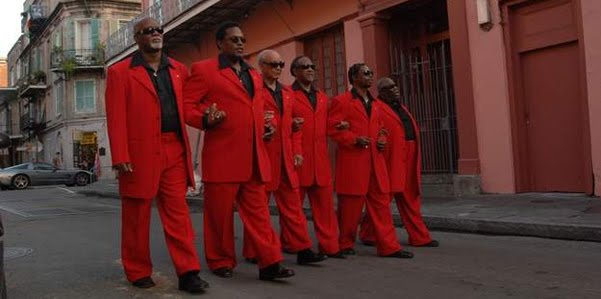I've interviewed a lot of musicians, but my recent chat with lead vocalist Jimmy Carter (!) of The Blind Boys of Alabama... well, this is one I'll never have trouble remembering.
We seemed to cover everything under the sun in about half an hour, but we could have easily talked all afternoon, as well.
I sat there in my chair and watched the rain come down past my window, in my hidey-hole north of Seattle, and listened to this weathered, yet vibrant voice coming through the wire from Montgomery, Alabama. We discussed the Blind Boys' latest CD — a collection of some of their guest appearances — and the pop artists who had asked the Blind Boys to record with them. We talked about what an unlikely pairing it was, the group meeting Lou Reed. Expectedly, faith frequently popped up.
The performer told me that that God denied him his sight because He wanted Carter to lead the life he had, as a gospel singer. Which led to a pause on my end of the phone. How do you respond to something like that?
We got along famously, and laughed a lot. Carter has a rich sense of humor; I suppose a man whose formative years were spent at the Alabama Institute For the Negro Blind, before touring and performing gospel music for decades — in good times and bad — would have to have a sense of humor. I even joked once about his being blind — it was that sort of conversation, and he is that sort of man. We were talking about the group's trademarked stage attire — tailored, colorful suits. I assumed that someone was around to make sure they all matched. We laughed again.
I bluntly broached the subject of touring churches with various gospel groups in the old Jim Crow South.
"Musicians like to complain about how tough it is on the road - counting pennies, sleeping in vans, etc.," I said, "I can't imagine dealing with those kinds of obstacles, plus being a black singer below the Mason-Dixon in the '50s and '60s."
And Carter told me exactly how it was — it was sometimes quite difficult. But he obviously got by — "With determination," he said. And, he added, with some help from the Lord. Carter explained that he and his bandmates were never hassled by the Klan or anyone — people looked out for them.
"But we knew our place — let's make that clear," he emphasized.
We knew our place. He uttered that words without a touch of sarcasm or bitterness in his voice, just matter-of-factly. I'd heard the phrase before, but never spoken to me. It stopped my brain in its tracks, though the conversation just rolled along.
It pains me to think of that phrase, to think of how such a wonderful man, such a great singer, once lived in an environment where the smart thing to do was to "know one's place." So long ago, but not long enough ago for a man who was there to forget. It makes me fightin' mad, just writing about it.
But Carter wasn't angry. He's a Grammy-winning gospel singer; a man dedicated to spreading Jesus' word through song. Anger is a bit out of place in his world.
We chatted on as if we were in my kitchen with a pot of coffee. Carter told me how he thanks God for his good life, and how he is surrounded by friends. He looked forward to the Blind Boys' appearance with Mr. Reed on the David Letterman show (which is tonight) and how much he was anticipating the group's upcoming performance for the President.
What a man. What a life of purpose, of conviction, of confidence in a higher power. What an interview.


